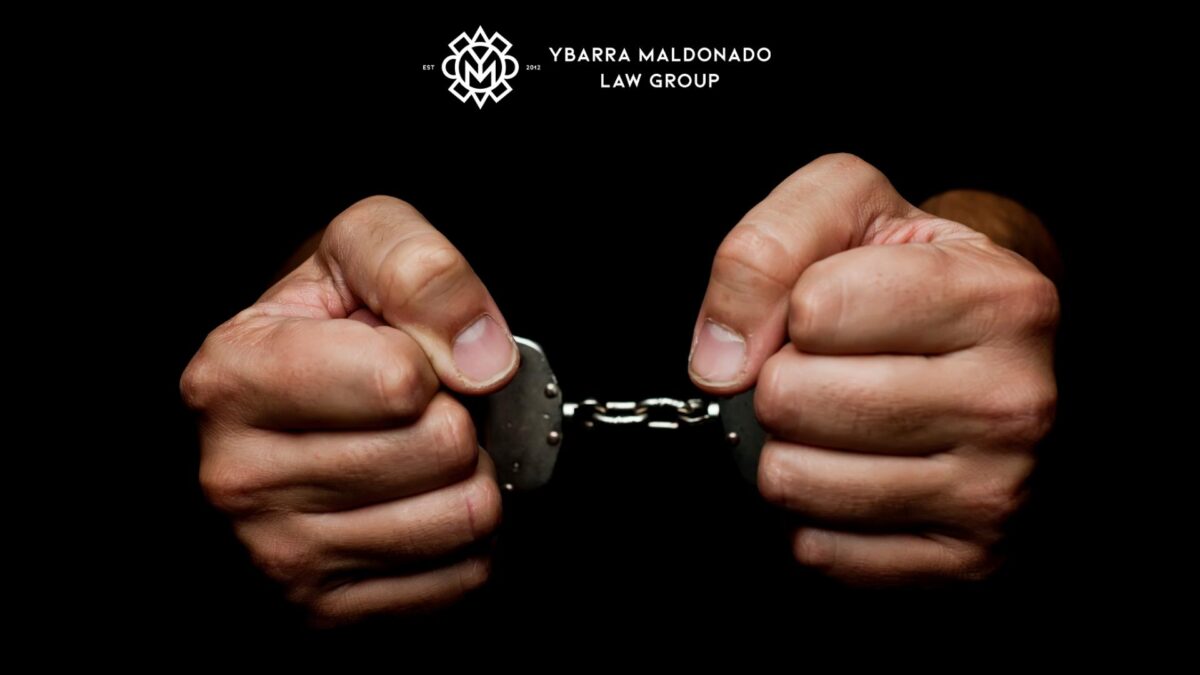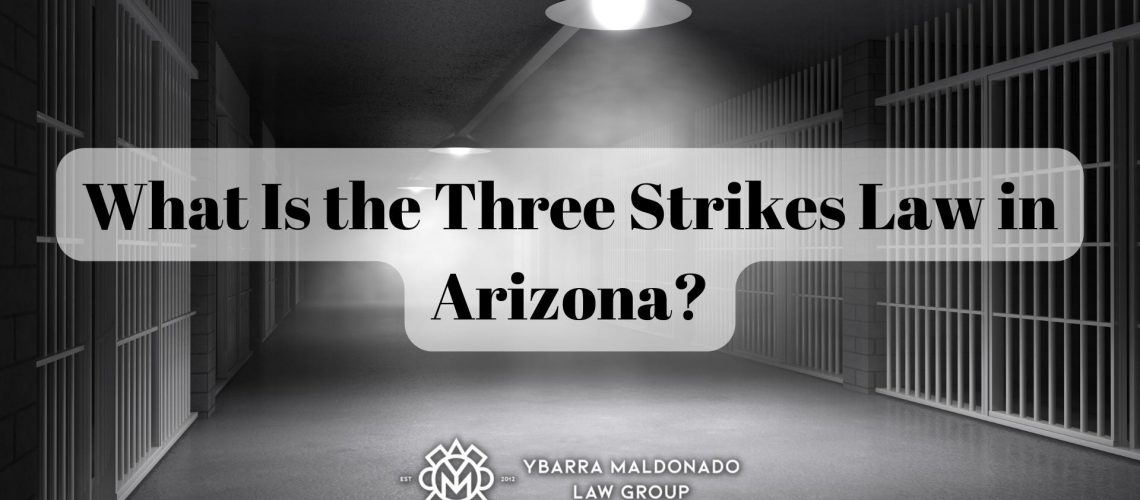When you hear the phrase “three strikes, and you’re out,” you may think about the Arizona Diamondbacks baseball games. However, when someone hears that phrase in the criminal justice system, they don’t get another opportunity at bat. This is true when it comes to the Arizona 3 strikes law.
The three-strikes law was created in the early 1990s as a way to deter previous offenders from committing the same or other violent or aggravated crimes. With this law, a person could face longer prison sentences if they were convicted of a third, dangerous crime.
If you’ve been convicted of a prior offense, it’s important to understand how the three-strikes law could affect any future criminal allegations. The Phoenix, AZ criminal defense attorneys at the Ybarra Maldonado Law Group understand the severity of being convicted under this law and how it can greatly impact a person’s life. When facing a possible life in prison, you want the best criminal defense attorney on your side. To discuss your charges with an experienced criminal defense attorney at the Ybarra Maldonado Law Group, call (602) 910-4040 to schedule a free initial case evaluation.
Does Arizona Have a Three Strikes Law?
Yes, Arizona adopted the three-strikes law in 2005.
ARS 13-706
Arizona Revised Statute 13-706 is also considered the three-strikes law and outlines the various crimes that are eligible for punishment by this law. According to ARS 13-706, a person at least 18 years or older who has been tried as an adult and convicted of a serious offense (other than a drug offense) is eligible for life in prison if they’ve committed two or more serious crimes not on the same occasion. If the person is convicted under the three-strike law, they’re not eligible for probation or parole, pardon, suspension, or release until they’ve served at least 25 years of their sentence.
What Started the Three Strikes Law?
In 1993, Washington became the first state to adopt the three-strikes law. While Washington was the first state to use the term “three-strikes,” laws regarding repeat offenders were nothing new. When Initiative 593, or “Three Strikes You’re Out,” passed in 1993, its goal was to lower the number of aggravated offenses by mandating harsher penalties for a third offense. The following year, California adopted its own three-strikes law, with many states later following suit.
Is the Three Strikes Law a State or Federal Law?

Since its inception in 1993, three-strikes laws have been adopted in over 25 states and by the federal government. If eligible for punishment under the three-strike law, a person in Arizona is subject to the laws at both the federal and state levels.
What Other States Have a Three Strikes Law?
While some states may not refer to three-strike laws the same, there are currently over 25 states throughout the United States that have some form of three-strike law in place. Some states call them “habitual offender laws.” According to habitual offender laws, a criminal can face harsher punishment if convicted of a second violent felony conviction. The states with habitual offender legislation don’t have to wait until the third strike to enact harsher penalties.
The states that have some version of three-strike laws are:
- Arizona
- Arkansas
- California
- Colorado
- Connecticut
- Delaware
- Florida
- Georgia
- Indiana
- Kansas
- Louisiana
- Maryland
- Massachusetts
- Missouri
- Montana
- Nevada
- New Jersey
- New Mexico
- North Carolina
- North Dakota
- Pennsylvania
- South Carolina
- Tennessee
- Texas
- Utah
- Vermont
- Virginia
- Washington
- Wisconsin
What Crimes Fall Under the Arizona 3 Strikes Law?

According to ARS 13-706, those convicted of a serious offense and who have two or more prior convictions on other occasions can face mandatory life imprisonment unless it’s a drug offense. Arizona law considers the following crimes serious and punishable by the three-strike law.
- Aggravated assault, with some exceptions
- Any dangerous crime against children
- Armed robbery
- Arson of an occupied structure
- Child sex trafficking
- First-degree burglary
- First-degree murder
- Kidnapping
- Manslaughter
- Second-degree murder
- Sexual assault
- Sexual conduct with a minor 14 years or younger
Any Violent or Aggravated Felony
In Arizona, the three-strike laws are more severe when the crime the offender is facing conviction for is a violent or aggravated felony. Aggravated or violent felonies increase the minimum prison sentence for a third conviction to 35 years under the three-strike law.
According to ARS 13-706, the following are considered violent or aggravated felonies:
- Armed robbery
- Child molestation
- Some forms of aggravated assault
- Arson of an occupied jail or prison
- Child sex trafficking
- Dangerous or deadly assault committed by a prisoner
- Committing assault to start a riot or participate in one
- Drive by shooting
- Commercial sexual exploitation of a minor
- Discharging a firearm in an occupied residential structure
- First-degree murder
- Continuous sexual abuse of a child
- First-degree burglary in an occupied residential structure
- Kidnapping
- Sexual assault
- Participating in or leading a criminal street gang
- Sexual exploitation of a minor
- Second-degree murder
- Sexual conduct with a minor when it’s a Class 2 felony
- Kidnapping a child for prostitution
- Unlawful introduction of a parasite or disease
- Terrorism
Violent Sexual Assault
Sexual assault offenses that are considered violent are also subject to harsher penalties, similar to the violent or aggravated felonies listed above. If any of the sexual crimes listed below “involve the use, discharge, or threatening exhibition of a deadly weapon or dangerous instrument or involve the infliction of serious physical injury and that person has a history of prior felony convictions for sexual offenses or any offense committed outside the state…” is considered guilty of violent sexual assault under ARS 13-1423. Under the statute, the following sex crimes can be punishable by harsher penalties:
- ARS 13-1404: Sexual abuse – When a person engages in sexual contact with a minor under 15.
- ARS 13-1405: Sexual conduct with a minor: When a person engages in sexual intercourse or oral sex with anyone under 18. If the minor was 15 years or younger, the offense is upgraded to a Class 2 felony.
- ARS 13-1406: Sexual assault: Engaging in sexual intercourse or oral sex without consent.
- ARS 13-1410: Molestation of a child: Any sexual contact with a child younger than 15.
Aggravated offenders who are found guilty of the above violent felonies can face life imprisonment without any possibility of release.
What Are Possible Defenses to a Third Strike Criminal Charge?
If you’re facing a third conviction for a violent or aggravated felony, you must contact the criminal defense attorneys at the Ybarra Maldonado Law Group as soon as possible. There is so much more at stake when a person has prior convictions that can fall under the three-strike law. When you choose a Phoenix criminal defense attorney to represent you against dangerous crime allegations, they will work diligently to prove your innocence. Your attorney will also work with the prosecution to try and negotiate a plea deal or convince them to drop the charges completely.
What to Do If You Are Facing a Third Strike Criminal Charge in Arizona

Following your arrest, it’s important to contact the criminal defense attorneys at the Ybarra Maldonado Law Group before the police question you. Your attorney will guide you on what questions you may or may not answer and can be present during questioning. Once you retain one of our experienced criminal defense attorneys, we’ll build a strong defensive strategy against the charges.
Your legal team won’t just go off the findings made by law enforcement but will conduct a thorough investigation, interviewing witnesses, studying the police reports, and more. Our goal is to provide the best legal representation possible to achieve the most favorable outcome possible.
Contact a Phoenix Criminal Defense Lawyer at Ybarra Maldonado Law Group Today
If you’ve been arrested on aggravated criminal charges and could face penalties under the three-strikes law, contact the Ybarra Maldonado Law Group. Your criminal defense attorney will fight for your rights and defend you against the charges because everyone deserves a fair trial, regardless of the crimes they’ve been accused of.
To schedule a case evaluation with one of our experienced criminal defense attorneys at the Ybarra Maldonado Law Group, call (602) 910-4040 today.

